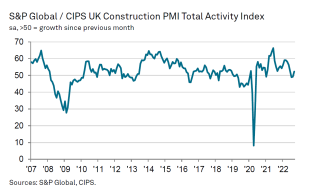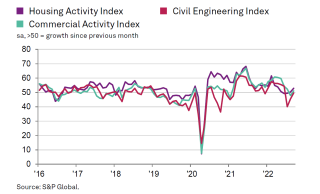Despite a return to growth after two months of falling output in UK construction, new orders are at their weakest since June 2020 when the first national covid lockdown ended.
These are the headlines from the latest monthly survey of construction purchasing managers.
Looking ahead 12 months, the panel of 150 survey respondents remain cautious about their growth prospects. The degree of confidence towards the business outlook dropped to its lowest for over two years, mostly reflecting concerns about higher interest rates and a downturn in the wider UK economy. Better news is that supply shortages have eased, with delivery delays their least widespread since February 2020.
At 52.3 in September, up from 49.2 in August, the headline seasonally adjusted S&P Global / CIPS UK Construction Purchasing Managers’ Index (PMI) – which measures month-on-month changes in total industry activity – registered above the 50.0 no-change value for the first time since June. Survey respondents attributed growth to previously delayed projects now coming on stream.
House-building was the best-performing category in September (index at 52.9), with growth reaching a five-month high. Commercial work increased only marginally (51.0), while civil engineering activity (49.6) fell for the third month in a row.
Survey respondents often commented on a strong pipeline of outstanding work, but incoming new orders remained relative scarce in September. Latest data signalled that new business volumes were broadly unchanged overall, which represented the worst month for new orders for almost two-and-a-half years. Construction firms cited slow decision-making among clients and greater risk aversion due to inflation concerns, squeezed budgets and worries about the economic outlook.
Employment growth picked up from August's 17-month low. Around 21% of the survey panel reported a rise in staffing levels, while only 8% signalled a decline. Higher workforce numbers reflected efforts to boost business capacity, although construction firms continued to cite shortages of candidates to fill vacancies and strong wage pressures.
Average cost burdens increased sharply again in September, but the overall rate of inflation eased to its lowest since February 2021. Escalating energy costs and materials prices were partially offset by lower fuel prices and improved transportation availability.

Tim Moore, economics director at S&P Global Market Intelligence, which compiles the survey, said: "UK construction companies experienced a modest increase in business activity during September, but the return to growth was fuelled by delayed projects and easing supply shortages rather than a flurry of new orders. Reports of delivery delays for construction products and materials were the least widespread since the pandemic began as greater business capacity and improved transport availability helped to ease pressure on supply chains.
"However, forward-looking survey indicators took another turn for the worse in September, with new business volumes stalling and output growth expectations for the year ahead now the lowest since July 2020. This reflected deepening concerns across the construction sector that rising interest rates, the energy crisis and UK recession risks are all set to dampen client demand in the coming months."
John Glen, chief economist at the Chartered Institute of Procurement & Supply, said: "Developments in the UK economy have given the sector food for thought as supply chain managers reported softer levels of buying last month and the new orders index slipped to its lowest since May 2020. Though the headline index showed growth after two months in contraction, the devil lies in the detail pointing to lower customer confidence, a challenging UK economy and recession on the doorstep.
"Firstly, the rise in output has no sign of sustainable growth behind it as without new pipelines of work any gains will soon leak away. This was not lost on builders themselves who reported the lowest level of optimism since July 2020 about business opportunities in the next year.
"Secondly, the costs of doing business and the cost of living are still high and rising. More expensive energy and salary pressures to secure skilled staff have contributed to additional inflation, though 21% of building companies in the sector were still hiring to maintain capacity for current projects.
"The housing sector remained the strongest performer in September although with interest rates rising and mortgage costs affecting affordability rates especially for first-time buyers, this will be an obstacle for house building to keep up the momentum as we approach 2023."
Mark Robinson, chief executive of local authority procurement agency Scape, said: “The construction sector is often one of the first to be impacted by changing economic winds, so an uptick amid recent market turbulence undoubtedly goes against the run of play.
“The restoration of the pound to pre-‘mini-budget’ levels – coupled with the chancellor’s energy support package – would provide greater short-term certainty on material and input prices but a challenging winter remains likely as wider inflation continues to affect costs across public and private sector projects.”
Got a story? Email news@theconstructionindex.co.uk





